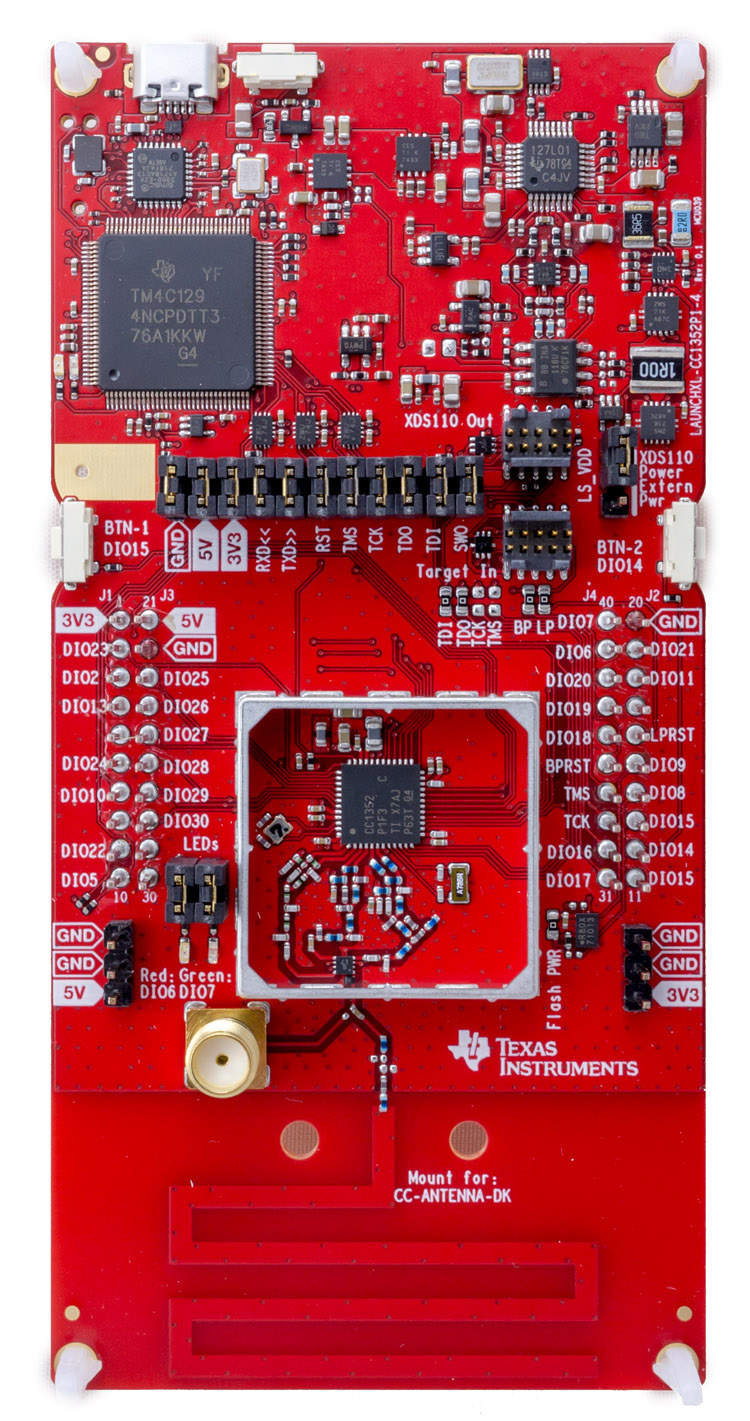mirror of
https://github.com/RIOT-OS/RIOT.git
synced 2024-12-29 04:50:03 +01:00
- Fix some typos - Add/Update attribution and copyright to related files - delete Makefile.dep
96 lines
2.8 KiB
Plaintext
96 lines
2.8 KiB
Plaintext
/**
|
|
@defgroup boards_cc1352p_launchpad TI CC1352P LaunchPad
|
|
@ingroup boards
|
|
@brief Texas Instruments SimpleLink(TM) CC1352P Wireless MCU LaunchPad(TM) Kit
|
|
*/
|
|
|
|
## Overview
|
|
|
|
The [LAUNCHXL-CC1352P](http://www.ti.com/tool/LAUNCHXL-CC1352P) is a Texas
|
|
Instrument's development kit for the CC1352P SoC which combines dual-band wireless MCU
|
|
with integrated power amplifier.
|
|
|
|
## Hardware
|
|
|
|

|
|
|
|
The board comes in two variants with different RF matching network on the 20 dBm PA output port:
|
|
|
|
- LAUNCHXL-CC1352P1: 868/915 MHz up to 20 dBm, 2.4 GHz up to 5 dBm
|
|
- LAUNCHXL-CC1352P-2: 868/915 MHz up to 14 dBm, 2.4 GHz up to 20 dBm.
|
|
|
|
For a more detailed information, please check out the [CC1352P datasheet](http://www.ti.com/lit/ds/swrs192c/swrs192c.pdf) or the [quick start guide](http://www.ti.com/lit/ug/swau108a/swau108a.pdf)
|
|
|
|
## Flashing and Debugging
|
|
|
|
The LAUNCHXL-CC1352P comes with an XDS110 on-board debug probe that provides
|
|
programming, flashing and debugging capabilities.
|
|
|
|
### TI Code Composer Studio _CCS_
|
|
|
|
The TI's [Code Composer Studio _CCS_](http://www.ti.com/tool/CCSTUDIO) is an Integrated Development Environment which provides the necessary tools to use the debug features of the XDS110.
|
|
|
|
### Uniflash
|
|
|
|
[Uniflash](http://www.ti.com/tool/UNIFLASH) is a standalone flash tool for TI MCUs, Sitara Processors & SimpleLink devices.
|
|
|
|
#### Setting up the environment
|
|
|
|
In order to make use of the programming and debugging capabilities of the XDS110 some environment variable needs to be set:
|
|
|
|
```
|
|
export CCS_PATH=<path to ti install folder>/ti/ccs930
|
|
export UNIFLASH_PATH<path to ti install folder>/ti/uniflash_5.2.0
|
|
```
|
|
|
|
That assumes you have CCS 9.3.0 (for the path name) and Uniflash 5.2.0, adjust
|
|
accordingly.
|
|
|
|
After that you can flash using the RIOT `make flash` command on your application
|
|
or to debug you first start the debug server:
|
|
|
|
```
|
|
make debug-server
|
|
```
|
|
|
|
And then on another terminal you can run:
|
|
|
|
```
|
|
make debug
|
|
```
|
|
|
|
It will open GDB and connect to the debug server automatically.
|
|
|
|
### Using OpenOCD
|
|
|
|
To use OpenOCD with the XDS110 you need to use the an special version of
|
|
OpenOCD made by TI (upstream version is not _yet_ compatible). You can
|
|
clone and compile it from source:
|
|
|
|
```
|
|
# Clone into the openocd-ti folder
|
|
git clone https://git.ti.com/cgit/sdo-emu/openocd openocd-ti
|
|
|
|
# Change directory to the openocd source code
|
|
cd openocd-ti/openocd
|
|
|
|
# Configure, build, install
|
|
./configure
|
|
make
|
|
sudo make install
|
|
```
|
|
|
|
#### Setting up the environment
|
|
|
|
Now that we have the TI version of OpenOCD we need to export the `PROGRAMMER`
|
|
environment variable, this is to enable OpenOCD instead of Uniflash.
|
|
|
|
```
|
|
export PROGRAMMER=openocd
|
|
```
|
|
|
|
Now we can just do `make debug-server` and then `make debug`, this all using
|
|
OpenOCD.
|
|
|
|
*/
|